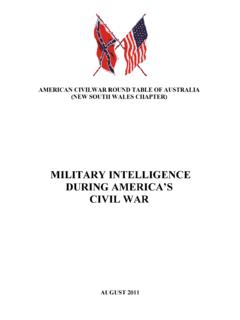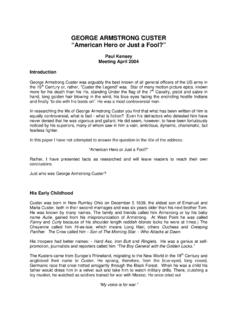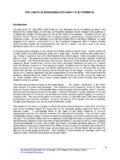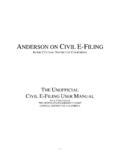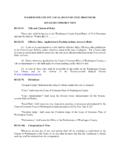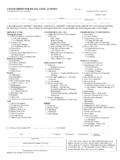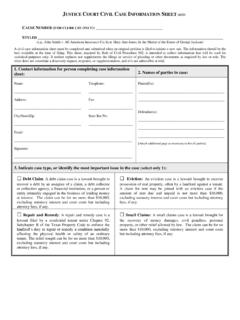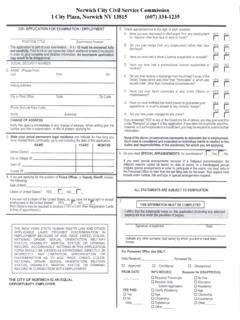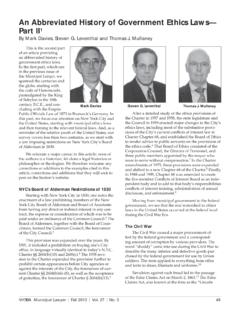Transcription of West Point Classmates - Civil War Enemies
1 west Point Classmates Civil War Enemies Paul Kensey Meeting October 2002 INTRODUCTION In 1909, just eight years after Federation, the Government of the Commonwealth of Australia invited Field Marshall Lord Kitchener to inspect and advise on the military forces required for our newly created nation. One of Kitchener s early recommendations was the establishment of a military college to train young men as officers for the newly formed army. He recommended, also, the appointment of Colonel W T Bridges to be the College s first Commandant. Bridges, a British officer, had attended the Royal Military College of Canada before being commissioned into the British Army. Before taking up his appointment as Commandant of Australia s new military college, Bridges visited military colleges in Berlin, St Cyr in France, The Royal Military Academy, Sandhurst and The Royal Military College, Woolwich, both in Britain, The Royal Military College, Kingston in Canada and the United States Military Academy, west Point .
2 Following these visits, Colonel Bridges made a number of observations and recommendations that he presented to the Australian Government. One of these recommendations was that the Military College of Australia should be based on principles and philosophies of west Point . The reasons that underpinned this conclusion and recommendation were numerous but may be summarised as: Unlike other military colleges of that era, west Point was not elitist, opening its doors to all, irrespective of class or socio-economic background; and The quality and international standing of the men the Academy had produced throughout the nineteenth century was most impressive. SOME west Point GRADUATES Just who were these men that so impressed Colonel Bridges and, as a consequence, the Australian Government?
3 They were officers who had served in America s Civil War, both Federal and Confederate officers, including some who had fought, also, in the earlier Mexican War and the later Spanish-American War. They were men like: Edward Porter Alexander, the Confederate artillery commander at Gettysburg; Robert Anderson, the Federal commander during the first attack on Fort Sumter; Pierre Gustav Toutant Beauregard, Anderson s opposing commander at Fort Sumter; John Buford, the Union Cavalry commander who held up a superior Confederate force on Day One of Gettysburg gaining much needed time for the Federals; Ambrose Burnside, sometime Commander of the Army of the Potomac following McClellan s sacking by Lincoln; George Armstrong Custer, later to achieve notoriety1 at the Battle of Little Big Horn; Jefferson Davis, the Confederacy s President; Jubal Early, the Confederate general whose post-war writings surpassed his military achievements during the Civil War.
4 Richard Ewell, commander of the Confederate II Corps at Gettysburg; Ulysses S Grant, the victorious Union Commander and later US President; Winfield Scott Hancock, one of the Union s most competent corps commanders throughout the War; Henry Heth, the Confederate commander of the division that first encountered the Federals at Gettysburg; an able field commander throughout the War who was known as the only officer that Lee called by his Christian Name; John Bell Hood, a fighting divisional commander who really lost it in higher command, particularly as the Confederate Army Commander at the Battle of Franklin in late 1864; Joseph Hooker, the Commander of the Army of the Potomac after Burnside but was forced to resign after he lost Lincoln s confidence following the Union defeat at Chancellorsville; Albert Sidney Johnston, considered the best Confederate field commander until his service was cut short with his untimely death at the Battle of Shiloh; Robert Edward Lee, the Confederate s inspirational commander from early in 1862 until the end of the War; James Longstreet, described by Lee on more than one occasion as My Old Warhorse.
5 He was Lee s trusted lieutenant and corps commander up until the surrender in 1865; George Meade, the newly appointed Commander of the Army of the Potomac in the days before the Battle of Gettysburg, replacing Joseph Hooker; George McClellan, the brilliant organiser and trainer who formed the Army of the Potomac into a viable force, but was unable to lead it effectively in battle and was ultimately relieved of command by Lincoln; George Pickett, the commander of one of the divisions in the unsuccessful Confederate charge that bears his name on Day 3 of the Battle of Gettysburg; Philip Sheridan, the Union s outstanding cavalry commander who provided Grant with considerable support in the latter parts of the War; 1 It must be remembered that irrespective of what we may think of Custer now, he was regarded in his time as not only a national hero but was internationally admired as well.
6 2 William Tecumsah Sherman, who with Grant was the most successful of the Union commanders but hated by the South for his total war policy in his March to the Sea and through the Carolinas; James Ewell Brown (JEB) Stuart, the Confederacy s outstanding cavalry commander until his death at Yellow Tavern in 1864. And there were many, many more! THE EARLY DAYS OF THE ACADEMY In the nineteenth century, west Point had become the pinnacle of the concept of military professionalism. It was regarded as the leading School of Engineering on the continent and had a world-wide reputation for excellence in engineering studies. It transformed boys into the kind of men who would become, one day, military and political leaders and Civil War Enemies . west Point may be considered in two senses: First, there is the Academy itself, established by one of the founding fathers of the Republic, Thomas Jefferson, in 1802 on the banks of the Hudson River 50 miles north of New York.
7 The other is the spiritual west Point a mystique, a feeling of belonging, of male bonding and something very powerful. It is often said, albeit incorrectly, that a disproportionate number of young men of the South attended west Point . Just as there is in Australia, the United States had a policy of State quotas with selection based on the male population of the States and this was scrutinised very closely by politicians. It is true, however, that the desire to become a soldier was greater in the South. ADMISSION TO west Point To attend west Point one needed to be first nominated by the local Congressman or Senator. One enterprising young Virginian considered the competition from his home State would be far too great for him to be successful, so he moved to Illinois where he had a friend introduce him to the local Congressman who was only too pleased to support the young man s nomination.
8 The young man was George Pickett and the Congressman Abraham Lincoln. One can only wonder what must have gone through their minds over the four years of the War! Following nomination, the prospective cadet sat for an entrance examination. The standards for this examination were straightforward and simple with the examination designed to give the unlearned an opportunity for admission to the Academy. Possibly one of the least educated candidates to gain entry to west Point was a young lad from the backwoods of Virginia who had not had the opportunity for any formal school education. This was Thomas Jonathon Jackson, who was later, during the Civil War, to earn the nickname of Stonewall , and only secured entry to west Point by his sheer determination and absolute sincerity. Both of Jackson s parents had died before he was seven and his father s stepbrother raised him and, having no time for this book learning , put young Thomas to work in any job he could find.
9 Writers describe Jackson in such terms as eccentric, friendless, depressive and determined. Throughout his life Jackson believed that he had to work harder than anyone just to achieve and his entry into west Point was just one example of this. At the Academy Jackson had no time for the frivolity shown by other cadets. He believed he needed to devote all his time to study to achieve particularly as he 3had as a classmate the brilliant George Brinton McClellan. Jackson s study and determination paid off and he was happy when he graduated 17th out of 56 in the Class of 18462. His classmate, the brilliant McClellan could never accept the fact that he graduated only second in this Class of 46. Jackson s tenacity and determination was to be proven many times during his military service but possibly no more so than on Henry House Hill during the First Battle of Manassas as he turned certain defeat into victory and the legend of Stonewall Jackson was born.
10 Stonewall Jackson is still considered one of the greatest field commanders of all time. Jackson s life and service greatly impressed Colonel Bridges and his acceptance to the Academy demonstrated beyond doubt the egalitarianism underpinning the selection to west Point . The fact that a hillbilly from Clarksburg in what is now the State of west Virginia could gain admission to the Academy showed that it was not elitist and that this feature should be the model for the proposed Military College of Australia. THE west Point CURRICULUM The aim of west Point was to produce officers of character and skill and, to this end, the Academy s curriculum was demanding and rigorous over the four years of its program. The curriculum was designed to produce competent engineers3 and sub-unit commanders.
